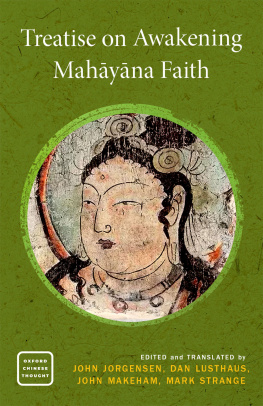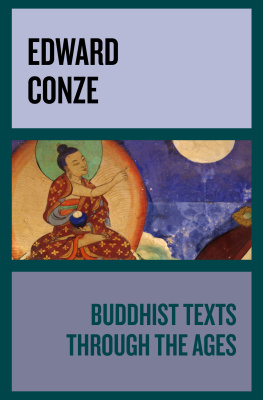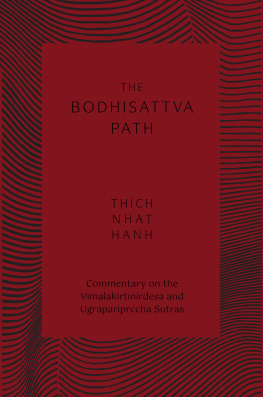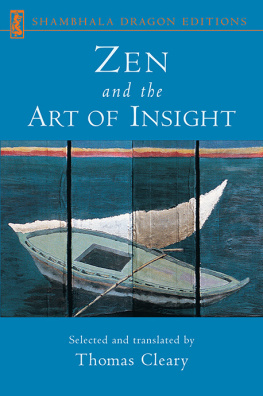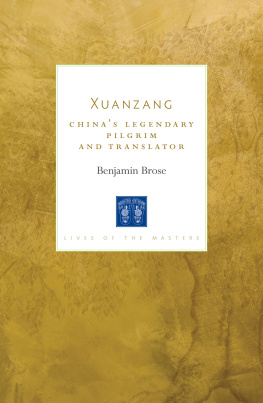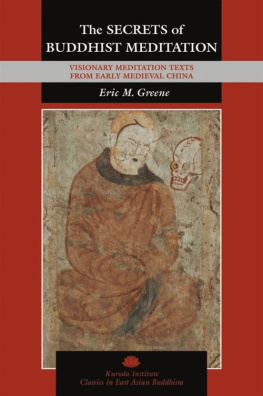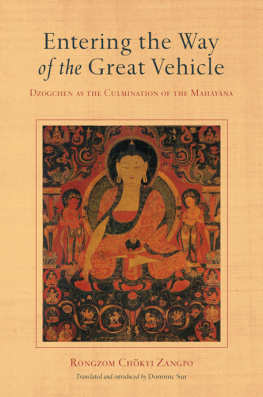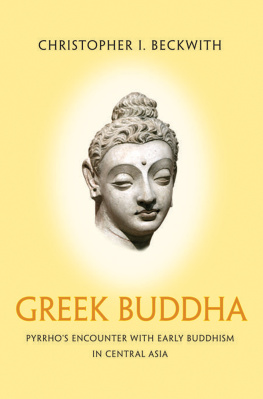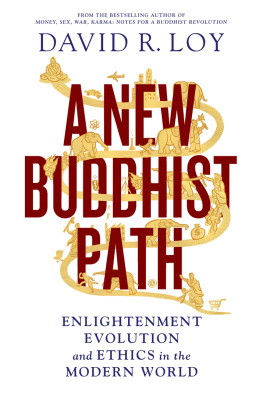Treatise on Awakening Mahyna Faith
Oxford Chinese Thought
Series Editors
Eric L. Hutton and Justin Tiwald
Zhu Xi: Selected Writings
Edited and translated by Philip J. Ivanhoe
Treatise on Awakening Mahyna Faith
Edited and translated by John Jorgensen, Dan Lusthaus, John Makeham, and Mark Strange

Oxford University Press is a department of the University of Oxford. It furthers the Universitys objective of excellence in research, scholarship, and education by publishing worldwide. Oxford is a registered trade mark of Oxford University Press in the UK and certain other countries.
Published in the United States of America by Oxford University Press 198 Madison Avenue, New York, NY 10016, United States of America.
Oxford University Press 2019
All rights reserved. No part of this publication may be reproduced, stored in a retrieval system, or transmitted, in any form or by any means, without the prior permission in writing of Oxford University Press, or as expressly permitted by law, by license, or under terms agreed with the appropriate reproduction rights organization. Inquiries concerning reproduction outside the scope of the above should be sent to the Rights Department, Oxford University Press, at the address above.
You must not circulate this work in any other form and you must impose this same condition on any acquirer.
Library of Congress Cataloging-in-Publication Data
Names: Jorgensen, John, 1952 translator.
Title: Treatise on Awakening Mahyna Faith /
translated by John Jorgensen, Dan Lusthaus, John Makeham and Mark Strange.
Other titles: Dasheng qixin lun. English
Description: New York, NY, United States of America :
Oxford University Press, [2019] | Series: Oxford Chinese thought |
Includes bibliographical references and index.
Identifiers: LCCN 2018052190 (print) | LCCN 2019013667 (ebook) |
ISBN 9780190297725 (updf) | ISBN 9780190297732 (epub) |
ISBN 9780190297701 (cloth : alk. paper) | ISBN 9780190297718 (pbk. : alk. paper)
Subjects: LCSH: Mahayana Buddhism. | Dasheng qixin lun.
Classification: LCC BQ7374 (ebook) | LCC BQ7374.D3713 2019 (print) |
DDC 294.3/42042dc23
LC record available at https://lccn.loc.gov/2018052190
Contents
Eric L. Hutton and Justin Tiwald
Chinese writings from premodern times constitute a vast body of texts stretching back over 2,500 years, and while Western studies of China have been growing, many riches from the Chinese tradition have remained untranslated or have been given only partial translations, sometimes scattered across multiple publication venues. This situation obviously poses a problem for those who want to learn about Chinese thought but lack the ability to read Chinese. However, it also poses a problem even for scholars who specialize in Chinese thought and can read Chinese, because it is not easy to read across all the time periods and genres in the Chinese corpus. Not only did the Chinese language change over time, but in some genres particular vocabularies are developed and familiarity with certain earlier textssometimes quite a large number of textsis presumed. For this reason, scholars who focus on one tradition of Chinese thought from a given era cannot simply pick up and immediately understand texts from a different tradition of thought in another era. The lack of translations is thus an impediment even to specialists who can read Chinese but wish to learn about aspects of Chinese thought outside their normal purview. Furthermore, scholars are often hampered in their teaching by the lack of translations that they can assign to students, which then becomes a barrier to promoting greater understanding of Chinese history and culture among the general public.
By offering English translations of Chinese texts with philosophical and religious significance, Oxford Chinese Thought aims to remedy these problems and make available to the general public, university students, and scholars a treasure trove of materials that has previously been largely inaccessible. The series focuses on works that are historically important or stand to make significant contributions to contemporary discussions, and the translations seek to strike a reasonable balance between the interests of specialists and the needs of general readers and students with no skills in Chinese. Translators for the series are leading scholars and experts in the traditions and texts that they render, and the volumes are meant to be suitable for classroom use while meeting the highest standards of scholarship.
The present volume, Treatise on Awakening Mahyna Faith, is itself a treasure trove of historical, philosophical, and religious insight. The avowed aim and purpose of the Treatise is to establish faith in the soundness and efficacy of the Mahyna Buddhist path, which it accomplishes in part by setting forth a framework for much of Buddhist metaphysics and psychology, reconciling what had largely been competing views about the nature of mind, consciousness, the buddha-nature, the phenomenal world of arising and ceasing, and the sources of ignorance and falsehood. The Treatise is without question one of East Asias most influential philosophical and religious texts. From the late sixth century CE to the present day, it has been the subject of over three hundred commentaries and has been invoked by countless Buddhist thinkers as an authority on doctrine and practice. It is often credited with shaping the schools and lineages of Buddhism that are most distinctively East Asian, including Huayan and Chan (in Japanese, Zen). This translation was conducted by a team of leading Buddhologists and specialists in Chinese thought, and is accompanied by a substantial introduction as well as several other supporting tools, including glossaries, that should be of use both to novice learners and established scholars of Buddhism alike. We hope and expect that students and scholars and even non-academic Buddhist practitioners will find it an indispensable window into some of the most stimulating and important developments in the history of Buddhism.
This translation began as an ANU Literary Chinese Reading Group exercise in 2012. Since then, the project has grown considerably in scope and complexity. We would like to thank John Powers for his contributions to the Reading Group; Jason Clower for his input at the workshops; and the Chiang Ching-kuo Foundation for International Scholarly Exchange for funding our research on the doctrinal and exegetical strategies employed in key commentaries on the Treatise. We extend a particular note of gratitude to Keng Ching for his generous contributions to the introduction and his valuable constructive feedback on the draft translation.
John Jorgensen is a senior research associate in the China Studies Research Centre at La Trobe University. A specialist in Chinese, Japanese, and Korean Chan Buddhism, he taught at Griffith University in Queensland and was a researcher at The Australian National University before taking up his current role at La Trobe University.
Dan Lusthaus, a leading scholar of Yogcra Buddhism, has published extensively on Indian, Chinese, and Japanese philosophy. He has taught at UCLA, University of Illinois Champaign-Urbana, and Boston University, and has been a research associate at Harvard University since 2005.

